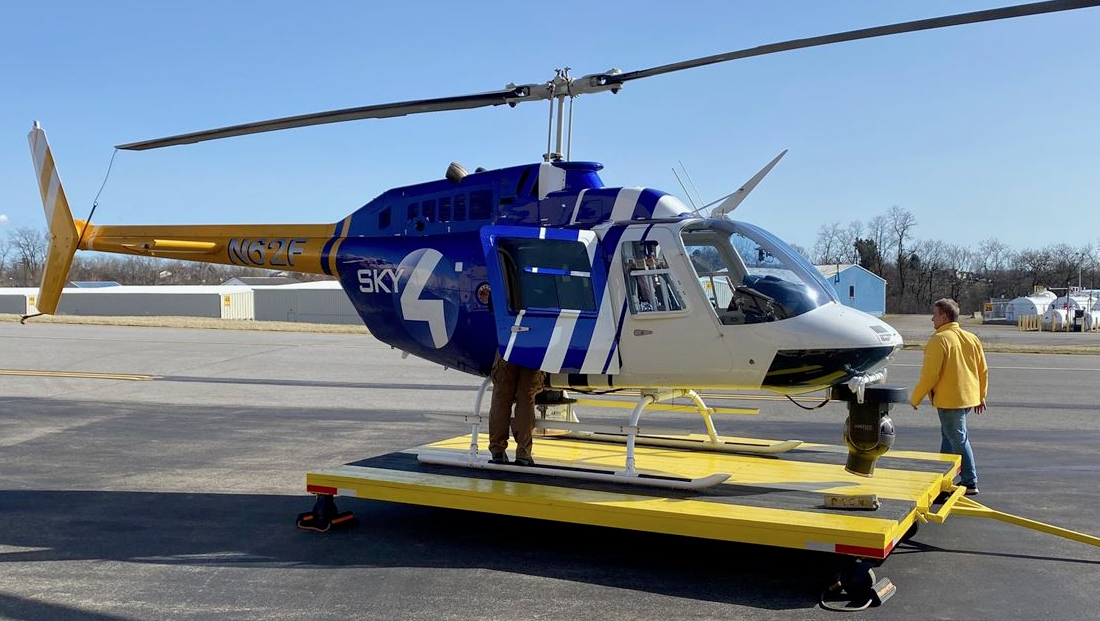Pittsburgh stations won’t continue to use shared news chopper

Subscribe to NCS for the latest news, project case studies and product announcements in broadcast technology, creative design and engineering delivered to your inbox.
Two big three affiliates in Pittsburgh, Pennsylvania, will be grounding the news helicopter the two stations share.
KDKA, which is owned by CBS, and Cox’s WPXI have been sharing a helicopter for several years now as a way to share the cost of having an aircraft on standby for news stories.
That agreement, however, is slated to end soon, and neither station plans on replacing the chopper with one of its own.
Instead, photojournalists licensed to operate drones equipped with cameras will be used to gather more aerial footage as needed.
The move means that Hearst’s WTAE will be the only station in the market left with its own helicopter, which is branded as Sky4.
Most local TV stations don’t actually own their news helicopters outright, instead paying a third-party to hold own and maintain the craft, but typically it’s only used for newsgathering purposes by the station or stations in question.
Going forward, it is possible that KDKA or WPXI could pay a daily or hourly fee to a local helicopter charter company if aerial footage is needed that can’t be achieved using a drone (this is common in markets where stations have gotten rid of helicopters as well).
Helicopters used to be more popular at TV stations, especially in larger markets and were often featured with much fanfare in station promos and would also sometimes touchdown at local events.
However, as operating costs rose and drones emerged as an alternative to capturing aerial footage, including live views, many station management was left questioning if the expense was worth it.
Some opted to share an aircraft as a way to cut down costs, but it now appears even that expense is becoming harder to justify.
News choppers are popular for allowing stations to patrol local interchanges and freeways for traffic snarl ups, capture video of fires, car accidents and, of course, infamous car chases.
Drones used for commercial purposes, including newsgathering, require an operator to obtain a license issued by the FCC, though one is relatively easy to obtain and does not require anything close to the training or skill to pilot a full size aircraft.
Drones do have some disadvantages over helicopters: They often can’t fly as high as most helicopters or for as long. Most drones use batteries while helicopters use fuel.
When gathering news footage, drone operators are also required to maintain “line of sight” to the drone, meaning they must be able to see it (or have a second spotter in communication with them who is watching).
This could limit how far the drone could fly from the launch site, though in many cases the battery would drain if the drone flew that far away and likely end up losing power and ultimately crashing.
News helicopters, like many small aircraft, do have some significant safety issues.
Back in December 2023, two staffers at WPVI in Philadelphia were killed when their helicopter crashed on its way back from an assignment. Unfortunately, the station is not alone in ones that have lost staffers to chopper crashes.
Subscribe to NCS for the latest news, project case studies and product announcements in broadcast technology, creative design and engineering delivered to your inbox.




tags
Drones & Drone Video Systems, FCC, helicopter, kdka, news drones, news helicopter, pittsburgh, wpxi, wtae
categories
Broadcast Business News, Broadcast Helicopters, Broadcast Industry News, Featured, Policy